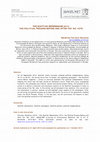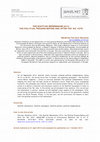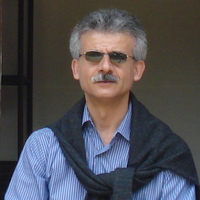Papers by Sandrina Antunes
Europeanization and Territorial Politics in Small European Unitary States, 2020

Janus.net, 2015
On 18 September 2014, Scottish voters narrowly rejected political independence, losing 44.7% to 5... more On 18 September 2014, Scottish voters narrowly rejected political independence, losing 44.7% to 55.3%. Yet during more than 16 weeks, two opposing campaigns – Yes Scotland versus Better Together – strove to convince Scotland that political independence versus keeping the Union was the best choice for Scotland's future. Filled with many unexpected moments, the campaign was intense, vibrant and almost breath-taking. The purpose of this article is to deliver a coherent and consistent account of the Scottish campaigns in order to make sense of the 'No' vote. In this article, we will proceed in four sections: first, we will put the referendum in context; second, we will highlight major aspects of the campaigns; third, we will bring the political process up-to-date and clarify the terms of the agreement reached under the Smith Process. Finally, in the last part, we will summarise the lessons to learn from the political outcome of the referendum.

On 18 September 2014, Scottish voters narrowly rejected political independence, losing 44.7% to 5... more On 18 September 2014, Scottish voters narrowly rejected political independence, losing 44.7% to 55.3%. Yet during more than 16 weeks, two opposing campaigns - Yes Scotland versus Better Together - strove to convince Scotland that political independence versus keeping the Union was the best choice for Scotland’s future. Filled with many unexpected moments, the campaign was intense, vibrant and almost breath-taking. The purpose of this article is to deliver a coherent and consistent account of the Scottish campaigns in order to make sense of the ‘No’ vote. In this article, we will proceed in four sections: first, we will put the referendum in context; second, we will highlight major aspects of the campaigns; third, we will bring the political process up-to-date and clarify the terms of the agreement reached under the Smith Process. Finally, in the last part, we will summarise the lessons to learn from the political outcome of the referendum.
In the discipline of International Relations (IR), realism is a school of thought that emphasises... more In the discipline of International Relations (IR), realism is a school of thought that emphasises the competitive and conflictual side of international relations. Realism’s roots are often said to be found in some of humankind’s earliest historical writings, particularly Thucydides’ history of the Peloponnesian War, which raged between 431 and 404 BCE. Thucydides, writing over two thousand years ago, was not a ‘realist’ because IR theory did not exist in named form until the twentieth century. However, when looking back from a contemporary vantage point, theorists detected many similarities in the thought patterns and behaviours of the ancient world and the modern world. They then drew on his writings, and that of others, to lend weight to the idea that there was a timeless theory spanning all recorded human history. That theory was named ‘realism’.
Negociação internacional: estratégias e táticas
Regional & Federal Studies
Regional & Federal Studies
Regional & Federal Studies
Federalisme Regionalisme, Dec 14, 2010
O poder da palavra no referendo sobre o processo da Regionalização 145 de Portugal Continental em... more O poder da palavra no referendo sobre o processo da Regionalização 145 de Portugal Continental em 1998 Designação geral Movimentos nacionais/ regionais Designação caso a caso Personalidades Políticas/intelectuais

This analysis stems from a desire to understand more thoroughly one of the most interesting polit... more This analysis stems from a desire to understand more thoroughly one of the most interesting political and participatory processes that have taken place in the first two decades of the 21st century in Europe: the referendum on self-determination for Scotland held in September 2014.
In an exemplary way, the Scots have shown us the way forward for the resolution of the democratic aspirations to sovereignty of European Nations without States. We deem necessary to take advantage of this experience as a source of learning for all peoples claiming their right to self-determination and independence. This is why we decided to offer a contribution to a better understanding of some of the factors and variables present in the Scottish case.
We wished to further understand the mechanisms and underlying logic involved in the perceptions and behaviours of the Scottish population faced with a question that has changed the future of Scotland and Europe forever. To do this, we decided to analyse the process from three different perspectives. First of all, we wished to examine, in the most detailed way possible, how the design of campaigns in favour and against the independence of Scotland affected the opinion of the people of Scotland (taking into account sociodemographic variables such as social class, gender, education and age). We also wanted to learn what discursive elements were decisive in the final choice for which people voted. Secondly, we reviewed the level of mobilization on social networks of activists in favour of the Yes and No camps, noting how much support and action within this context was transformed into actual electoral support for the different campaigns. Finally, we tracked the international component of the referendum and its effect on the global agenda. We examined how the issue generated public opinion and forced many socio-political protagonists to come down on one side or the other. In short, we sought to examine fully a phenomenon that received enough attention, in a large part of the Western world, to warrant its prominence, for months, on the front pages of the most influential international newspapers.

Journal of Multilingual and Multicultural Development, 2012
"""This book sheds lig... more """This book sheds light on the complicated, multifaceted relationship between nationalism and democracy by examining how nationalism in various periods and contexts shapes, or is shaped by, democratic practices or the lack thereof. This book examines nationalism’s relationship with democracy using three approaches: • The challenge of democracy for sub-state nationalism: analyzing the circumstances under which sub-nationalism is compatible with democracy, and assessing the democratic implications of various nationalist projects. • The impact of state nationalism on democratic practices: examining the implications of state nationalism for democracy, both in countries where liberal democratic principles and practices are well established and where they are not. • Understanding how state nationalism affects democratization processes and what impact sub-state nationalism has in these contexts."""











Uploads
Papers by Sandrina Antunes
In an exemplary way, the Scots have shown us the way forward for the resolution of the democratic aspirations to sovereignty of European Nations without States. We deem necessary to take advantage of this experience as a source of learning for all peoples claiming their right to self-determination and independence. This is why we decided to offer a contribution to a better understanding of some of the factors and variables present in the Scottish case.
We wished to further understand the mechanisms and underlying logic involved in the perceptions and behaviours of the Scottish population faced with a question that has changed the future of Scotland and Europe forever. To do this, we decided to analyse the process from three different perspectives. First of all, we wished to examine, in the most detailed way possible, how the design of campaigns in favour and against the independence of Scotland affected the opinion of the people of Scotland (taking into account sociodemographic variables such as social class, gender, education and age). We also wanted to learn what discursive elements were decisive in the final choice for which people voted. Secondly, we reviewed the level of mobilization on social networks of activists in favour of the Yes and No camps, noting how much support and action within this context was transformed into actual electoral support for the different campaigns. Finally, we tracked the international component of the referendum and its effect on the global agenda. We examined how the issue generated public opinion and forced many socio-political protagonists to come down on one side or the other. In short, we sought to examine fully a phenomenon that received enough attention, in a large part of the Western world, to warrant its prominence, for months, on the front pages of the most influential international newspapers.
In an exemplary way, the Scots have shown us the way forward for the resolution of the democratic aspirations to sovereignty of European Nations without States. We deem necessary to take advantage of this experience as a source of learning for all peoples claiming their right to self-determination and independence. This is why we decided to offer a contribution to a better understanding of some of the factors and variables present in the Scottish case.
We wished to further understand the mechanisms and underlying logic involved in the perceptions and behaviours of the Scottish population faced with a question that has changed the future of Scotland and Europe forever. To do this, we decided to analyse the process from three different perspectives. First of all, we wished to examine, in the most detailed way possible, how the design of campaigns in favour and against the independence of Scotland affected the opinion of the people of Scotland (taking into account sociodemographic variables such as social class, gender, education and age). We also wanted to learn what discursive elements were decisive in the final choice for which people voted. Secondly, we reviewed the level of mobilization on social networks of activists in favour of the Yes and No camps, noting how much support and action within this context was transformed into actual electoral support for the different campaigns. Finally, we tracked the international component of the referendum and its effect on the global agenda. We examined how the issue generated public opinion and forced many socio-political protagonists to come down on one side or the other. In short, we sought to examine fully a phenomenon that received enough attention, in a large part of the Western world, to warrant its prominence, for months, on the front pages of the most influential international newspapers.